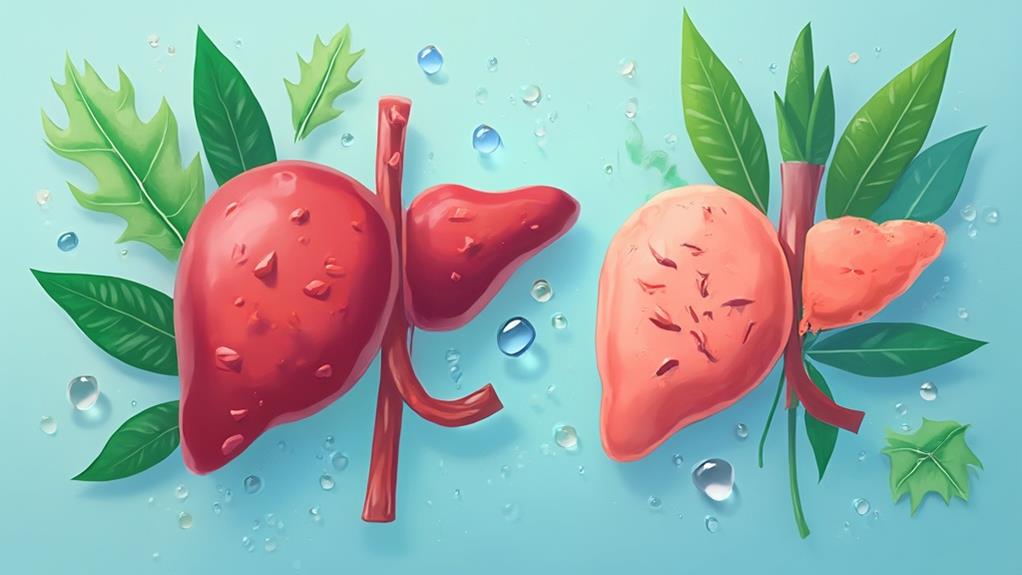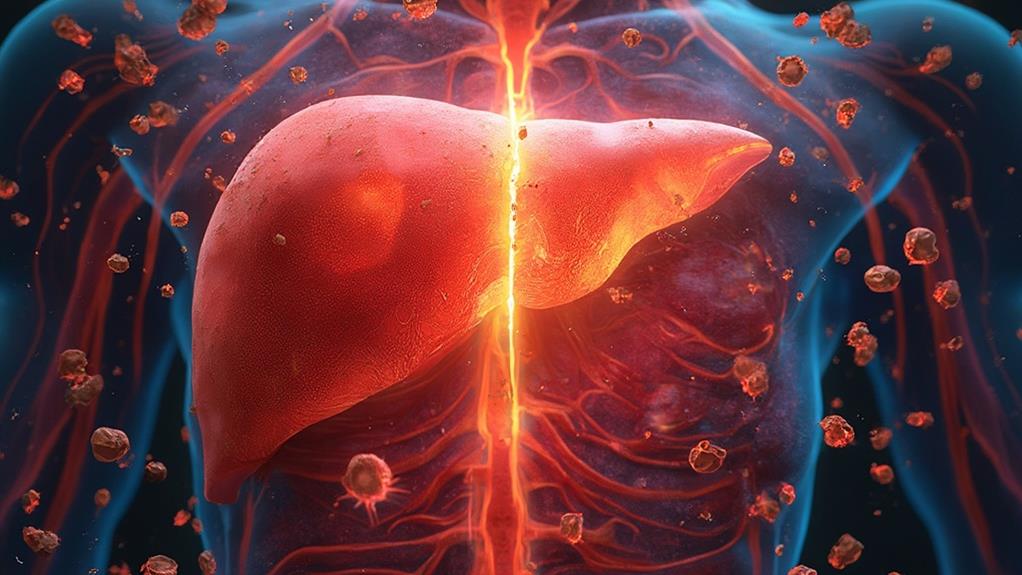
Do you know the advantages of quitting alcohol consumption? Quitting alcohol can transform your life by sharpening your mind and enhancing mental clarity. You’ll notice improved memory functions and reduced mental fog, making daily tasks easier. Your heart health will benefit too, with lower blood pressure and a reduced heart disease risk. You might find yourself losing unwanted pounds as your liver health improves and your body sheds alcohol-induced toxins.
Better sleep patterns will boost your daytime energy, and you’ll likely see stronger and healthier relationships flourishing due to increased emotional availability. Plus, a strengthened immune system keeps you protected from various illnesses. There’s much more to gain as you explore these benefits further.
Key Takeaways
- Enhanced mental clarity and sharper cognitive abilities improve memory and decision-making.
- Significant improvements in heart health and liver function reduce the risk of related diseases.
- Weight loss facilitated by metabolism boost and elimination of empty calories.
- Better sleep quality and regulated sleep cycles contribute to emotional well-being.
- Strengthened immune system decreases vulnerability to illnesses and enhances overall health.
Enhanced Mental Clarity
When you stop drinking alcohol, you might notice your thinking becomes sharper and more precise. This improvement in cognitive abilities can help you remember details and process information more efficiently, reducing the mental fog that often accompanies alcohol use.
With clearer thinking, you’re better equipped to handle daily challenges and make thoughtful decisions, enhancing both your personal and professional life.
Sharper Cognitive Abilities
Clearing your mind of alcohol’s haze can greatly sharpen your cognitive abilities and enhance your mental clarity. When you start on the journey of alcohol cessation, you’re not just saying goodbye to hangovers; you’re welcoming a clearer, more vibrant mental state. Here are some transformative benefits you can expect:
- Enhanced Mental Clarity: Without alcohol clouding your judgment, you’ll notice a significant boost in clarity and ability to make decisions. Everyday tasks become easier and less overwhelming.
- Improved Cognitive Processing Speed: Your brain isn’t weighed down by the depressive effects of alcohol, allowing for quicker thought processes. You’ll find that you’re able to solve problems and think on your feet much faster.
- Better Concentration: With improved focus, tasks that require sustained attention won’t seem as intimidating. You’ll be able to concentrate better, be it at work or while learning new skills.
- Increased Cognitive Functioning: Overall, your brain will start to operate more efficiently. This means better memory retention, faster processing speeds, and more effective thinking.
Improved Memory Function
As you set out on a journey away from alcohol, you’ll likely notice a significant improvement in your memory functions. Quitting alcohol can lead to a notable boost in your mental clarity, allowing you to recall details faster and more accurately. This improvement in your ability to remember can positively affect your daily tasks and learning abilities.
When you quit drinking, your brain begins to heal from the impairments caused by alcohol. This healing process helps in enhancing both your short-term and long-term memory recall. Studies have confirmed that sobriety supports the brain’s ability to store and retrieve information much more efficiently than before.
You’ll find that with improved memory function, your problem-solving skills will also get a boost. This is because sobriety helps clear the mind, making you more capable of focusing and thinking critically.
The fog that once clouded your judgment and memory will lift, offering you a clearer, sharper mental state.
Embracing sobriety not only sharpens your memory but also contributes to overall cognitive functioning. It’s an empowering step toward a clearer, more focused you, where you’re less forgetful and more mentally sharp. Remember, each step away from alcohol is a step towards a more vibrant, attentive mind.
Reduced Mental Fog
Imagine feeling sharper and more focused every day without the haze of alcohol clouding your mind. When you quit alcohol, the curtain of mental fog lifts, revealing a clearer, more vibrant cognitive landscape. Here’s what you can expect:
- Enhanced Cognitive Function: Without alcohol, your brain operates more efficiently. This means quicker thinking and better mental performance.
- Improved Decision-Making Skills: Sobriety allows you to make decisions with a clear mind, minimizing regrets and enhancing your ability to choose wisely in complex situations.
- Boosted Memory Retention: Alcohol can interfere with how memories are formed. Free from its effects, your capacity to remember and recall information improves significantly.
- Sharper Problem-Solving Abilities: With the mist of alcohol lifted, you’ll find yourself solving problems more effectively, thinking on your feet, and finding creative solutions more readily.
You’ll notice these changes as you maintain your sobriety, each day feeling a bit clearer than the last. This isn’t just about avoiding negatives; it’s about enhancing your natural abilities and reclaiming the sharpness that alcohol dulled. Embrace this journey to a clearer mind and watch how your world changes!
Improved Heart Health

When you decide to quit drinking alcohol, you’re taking a significant step towards improving your heart health. By cutting out alcohol, you can lower your blood pressure and stabilize your heart rate, which greatly reduces your risk of heart disease.
Additionally, improved circulation efficiency means your heart doesn’t have to work as hard, helping you feel better overall and supporting a healthier lifestyle.
Lower Blood Pressure
Quitting alcohol greatly lowers your blood pressure, reducing the risk of heart disease and stroke. You’re not just giving up a drink; you’re giving your heart a much-needed respite. When you cut out alcohol, you’re directly addressing high blood pressure, often referred to as hypertension, which is a significant risk factor for heart-related issues.
Here’s how reducing your alcohol intake impacts your cardiovascular system:
- Immediate Reduction in Blood Pressure: Even a small decrease in alcohol consumption can lead to noticeable changes in your blood pressure levels.
- Long-Term Heart Health: Consistently lower blood pressure reduces the strain on your heart and arteries, promoting a healthier cardiovascular system.
- Decreased Risk of Hypertension: Chronic drinking can lead to hypertension. Quitting helps normalize these levels, protecting you from associated complications.
- Overall Well-Being: Reduced blood pressure enhances your general health, making exercise easier and life more enjoyable.
You’re taking a crucial step towards a healthier life by letting go of alcohol. Each day without it strengthens your heart and reaffirms your commitment to a healthier lifestyle. Keep it up; your heart is thanking you!
Reduced Heart Disease Risk
Lowering your alcohol intake does more than just lower your blood pressure—it also reduces your risk of developing heart disease. By deciding to cut back or eliminate alcohol consumption, you’re taking a significant step towards enhancing your heart health.
Excessive drinking is linked to a variety of cardiovascular issues, including an elevated risk of heart failure. This isn’t just about avoiding negative outcomes; it’s about actively fostering a healthier heart.
When you reduce or stop alcohol intake, your blood pressure begins to normalize and your triglyceride levels—which are a type of fat found in your blood—also tend to drop. These changes are important because high levels of triglycerides contribute to the hardening of arteries, which can lead to heart disease. By keeping these levels in check, you’re directly combating heart disease risk.
It’s important to remember that while light drinking might’ve been noted for potential heart benefits, the safest bet for your heart really lies in moderation or abstinence. This commitment to lower or eliminate alcohol consumption can greatly improve your heart’s well-being and your overall health. Isn’t it worth considering for a stronger heart and a healthier life?
Enhanced Circulation Efficiency
By stepping away from alcohol, you’ll not only feel better mentally but also improve your heart’s health noticeably. When you quit drinking, several significant changes happen that boost your heart health and enhance circulation efficiency. Here’s how you’re helping your body:
- Lower Blood Pressure: Reducing your alcohol intake can lead to a decrease in blood pressure, a major factor in cardiovascular health.
- Reduced Triglyceride Levels: Alcohol can elevate triglyceride levels, which contribute to heart disease. Quitting helps lower these levels and reduces the risk of cardiovascular complications.
- Improved Blood Flow: Alcohol can constrict your blood vessels, impairing blood flow. Abstinence from alcohol restores optimum blood flow, enhancing the oxygen and nutrient supply to various organs.
- Stronger Cardiovascular System: With better circulation and reduced strain on your heart, your cardiovascular system undergoes less stress, improving its overall function and longevity.
Understanding these benefits can motivate you to maintain your alcohol-free lifestyle. Remember, each day without alcohol is a step towards a healthier heart and a more vibrant life. Your cardiovascular system will thank you for the break from alcohol’s taxing effects, ensuring a smoother, more efficient blood flow and healthier heart function.
Stabilized Heart Rate
Your heart’s workload decreases substantially when you stop drinking alcohol, leading to a more stabilized heart rate and reducing the risk of heart complications. This significant change can profoundly impact your overall health, especially concerning your cardiovascular system. You mightn’t realize how much strain alcohol places on your heart, but once you quit, the difference becomes clear.
By cutting out alcohol, you’re also helping to lower your blood pressure levels. High blood pressure is a major risk factor for heart disease, and by keeping it in check, you’re doing your heart a huge favor. This adjustment helps enhance heart function, making it easier for your heart to pump blood efficiently and effectively throughout your body.
Moreover, the reduction in alcohol consumption minimizes your cardiovascular risks. The threat of heart failure and other related health issues decreases, giving you a stronger, more resilient heart. You’re not just improving your heart health; you’re potentially extending your life and enhancing its quality.
Liver Regeneration

When you stop drinking alcohol, you give your liver a chance to heal and regenerate. Reducing your alcohol intake can greatly decrease liver damage and enhance its function, helping to prevent serious conditions like cirrhosis and fatty liver disease. By choosing to quit alcohol, you’re taking a powerful step towards promoting your liver’s health and improving your overall well-being.
Enhancing Liver Function
Lowering or completely stopping your intake of alcohol can greatly rejuvenate your liver function. When you stop drinking alcohol, your liver, an essential organ that works hard to filter toxins, begins to heal and regenerate. This not only improves your liver health but can also lead to a cascade of benefits for your overall well-being.
Here are four key ways enhancing your liver function can benefit you:
- Regeneration of Liver Cells: Reducing alcohol intake allows your liver cells to repair themselves, reducing the risk of developing serious conditions like cirrhosis and fatty liver disease.
- Improved Toxin Filtration: A healthier liver can more effectively filter harmful substances from your body, promoting better overall health.
- Reduced Risk of Liver Disease: By cutting back on alcohol, you’re significantly lowering the risk of liver-related diseases, ensuring a stronger, healthier liver.
- Enhanced Overall Well-being: Improved liver function supports not just physical health but contributes to improved sleep and mental clarity, making you feel rejuvenated and more balanced.
Reducing Liver Damage
Reducing your alcohol intake can greatly assist your liver heal and regenerate, thereby lessening the risk of sustaining long-term harm. When you lower alcohol consumption, you give your liver a much-needed pause from processing this harmful substance, allowing it to begin repairing itself.
You see, alcohol is toxic to liver cells, which play a crucial role in filtering toxins from your body. By reducing your intake, you’re directly contributing to decreasing liver damage. This change can notably enhance your liver’s ability to recover from the effects of alcohol.
If you’ve been drinking heavily—men with at least 15 drinks per week, and women with eight or more—you’re particularly at risk for liver issues. However, it’s never too late to make a change.
Promoting Liver Health
By choosing to cut down on your alcohol intake, you actively support your liver’s ability to heal and regenerate itself. This essential organ works tirelessly to detoxify your body, but excessive drinking can severely impair its functions. Here’s how reducing alcohol intake can promote liver health:
- Enhances Alcohol Detox: Reducing your alcohol consumption gives your liver a much-needed break, allowing it to focus on detoxifying accumulated toxins rather than processing new alcohol.
- Improves Liver Function: With less alcohol to process, your liver can repair itself more efficiently, improving overall liver function and decreasing the risk of long-term damage.
- Reduces Risk of Fatty Liver: Fatty liver, often a precursor to more serious conditions, can be notably reversed by cutting back on alcohol, giving your liver a chance to reduce fat accumulation.
- Prevents Progression to Cirrhosis: Cirrhosis is a severe form of liver damage. By moderating your drinking, you’re taking a vital step towards preventing its development.
Weight Loss Benefits

When you stop drinking alcohol, you’re also cutting out a substantial number of empty calories, which can really add up. This reduction in calorie intake can boost your weight loss efforts notably.
Additionally, your metabolic rate may improve, helping your body burn calories more efficiently even when you’re at rest.
Reduced Calorie Intake
Consider the empty calories you consume with each glass of alcohol, which can add up and contribute to weight gain. When you decide to stop drinking, you’re not just cutting out alcohol; you’re reducing your calorie intake to a noteworthy extent. This is a crucial step towards weight loss and healthier living.
Here’s how quitting alcohol aids in managing your weight:
- Elimination of Empty Calories: Alcohol contains “empty calories” that provide no nutritional value but are high in energy. Cutting out these can significantly reduce your daily caloric intake.
- Reduced Appetite: Alcohol consumption often leads to increased appetite and poor dietary choices. Without alcohol, you might find it easier to stick to healthier food options.
- Prevents Impulsive Eating: Alcohol can impair your judgment, leading to impulsive eating decisions. Sobriety helps in maintaining a disciplined eating routine, enhancing your weight management efforts.
- Calorie Reduction: By avoiding alcohol, the calories you save can accumulate remarkably, contributing directly to weight loss.
Every glass skipped means a step closer to a healthier you. It’s not just about losing weight but gaining vitality and control over your food choices and lifestyle. Let’s commence on this journey together, embracing a balanced and fulfilling life without alcohol.
Enhanced Metabolic Rate
Have you ever wondered how quitting alcohol boosts your metabolism, aiding in weight loss? When you stop alcohol consumption, your body undergoes noteworthy changes that positively impact your metabolic rate. Without alcohol’s empty calories burdening your system, you’re not only reducing calorie intake but also enhancing your body’s ability to burn fat more efficiently.
Alcohol can often lead to increased appetite and impulsive eating behaviors, which contribute to weight gain. By eliminating these liquid calories, you’re not just cutting down on sugar and carbs; you’re also less likely to succumb to late-night snacking or overeating during meals. This shift can markedly contribute to your weight loss goals.
Moreover, alcohol tends to slow down your metabolism because your body prioritizes metabolizing alcohol over other nutrients. This can lead to fat accumulation, especially around your midsection.
Once you quit drinking, however, your metabolic rate can recover, becoming more effective at processing nutrients and maintaining a healthy weight.
Better Sleep Patterns

When you quit drinking alcohol, you’re likely to notice a significant improvement in your sleep quality. Your sleep cycles will become more regulated, allowing you to enter the vital REM sleep stage, which is essential for a restful night. This enhanced sleep not only helps you wake up feeling more refreshed but also supports your overall health and cognitive functions.
Enhanced Sleep Quality
Quitting alcohol can greatly enhance your sleep quality, leading to more restorative REM cycles and fewer disruptions throughout the night. When you forgo that glass of wine or beer, your body begins to recalibrate its natural rhythms, which can profoundly impact how well you sleep.
Here are four vital ways your sleep quality can improve by quitting alcohol:
- Hydration Boost: Alcohol is a diuretic, which can lead to dehydration, negatively affecting your sleep. Without alcohol, your body maintains better hydration levels, supporting a deeper, uninterrupted sleep.
- Mood Stabilization: Regular alcohol consumption can exacerbate mood swings and anxiety, affecting your sleep. Cutting out alcohol helps stabilize your mood, making it easier to fall asleep and stay asleep.
- Fatigue Reduction: Alcohol can interrupt your sleep cycle, leading to feelings of fatigue during the day. By quitting, you minimize these disruptions and reduce daytime sleepiness.
- Hormone Balance: Alcohol impacts the hormones that regulate your sleep-wake cycles. Abstaining helps normalize these hormones, enhancing both the quality and consistency of your sleep.
Regulated Sleep Cycles
Better sleep patterns await you as you decide to stop drinking alcohol. By eliminating alcohol from your nightly routine, you’re paving the way for more regulated sleep cycles. This adjustment means your body can naturally synchronize its internal clock, leading to a more consistent sleep schedule. You’ll find yourself falling asleep more easily and waking up feeling refreshed.
When alcohol is no longer part of your equation, your body maintains better hydration levels. Hydration is essential for many bodily functions, including mood stability. Without alcohol-induced dehydration, you’re likely to experience fewer mood swings and a more stable emotional state, which can contribute to smoother and less interrupted sleep.
Moreover, giving up alcohol helps balance your hormones. These hormones play a significant role in regulating your sleep-wake cycles and even your feelings of hunger and fullness. With these hormones in harmony, you’ll notice not only improved sleep but also an overall enhancement in your physical and mental wellbeing.
Embrace this journey towards better health. As your sleep patterns improve, so will your energy and ability to handle daily stresses. Remember, each night of good sleep builds a stronger foundation for a healthier tomorrow.
Increased REM Sleep
Experiencing a notable increase in REM sleep is one of the remarkable benefits you’ll notice after you stop drinking alcohol. REM sleep is essential for your cognitive function, helping consolidate memories and process information from the day. You’ll start waking up feeling more refreshed and mentally sharp.
Here are some ways better REM sleep will enhance your life:
- Enhanced Cognitive Function: Improved REM sleep sharpens your brain’s ability to learn and remember, boosting your overall cognitive performance.
- Strengthened Emotional Regulation: You’ll find it easier to manage your emotions and stress, as quality REM sleep plays a pivotal role in emotional health.
- Reduced Risk of Chronic Diseases: Good sleep patterns help maintain heart health and reduce the likelihood of serious health issues.
- Improved Daily Focus and Clarity: With better sleep, your ability to concentrate and stay alert during the day will notably improve.
Reduced Cancer Risk

By choosing to quit alcohol, you’re not only taking a step towards a healthier lifestyle but also greatly reducing your risk of various cancers.
You can decrease your chances of liver, breast, colon, and throat cancers, all of which have been linked to alcohol consumption.
It’s a protective measure that can provide peace of mind and a longer, healthier life.
Lower Liver Cancer Risk
In light of the serious health risks associated with heavy drinking, you’ll find that quitting alcohol greatly reduces your chances of developing liver cancer. Here’s why reducing or completely stopping your alcohol consumption can be a life-saving decision:
- Direct Reduction in Risk Factors: Alcohol is a significant risk factor for liver cancer. By quitting, you’re directly removing this risk factor from your life, leading to a healthier liver.
- Promotion of Liver Health: Alcohol can cause severe damage to liver cells. When you stop drinking, you give your liver a chance to heal and regenerate healthier cells, which lowers your risk of cancer.
- Decrease in Associated Illnesses: Heavy alcohol use is linked not just to liver cancer but to other diseases that can compromise liver function. Reducing alcohol consumption can also lower your risk of developing these related conditions.
- Overall Well-being: Quitting alcohol contributes to a holistic improvement in health, which supports your body’s natural defenses against diseases, including cancer.
Decreased Breast Cancer Chance
Just as quitting alcohol markedly lowers your risk of liver cancer, it also reduces your chances of developing breast cancer. When you decide to stop or even just cut back on your alcohol consumption, you’re taking a notable step towards breast cancer prevention.
Studies have shown that even moderate alcohol consumption can elevate the likelihood of breast cancer, primarily due to its effects on hormone levels in your body.
Alcohol has a way of altering estrogen and other hormone levels, which can increase the risk. By choosing to quit drinking, you’re helping keep these hormone levels more balanced, which can markedly decrease your breast cancer risk.
It’s not just about eliminating a risk factor; it’s about empowering yourself and taking control of your health.
Reduced Colon Cancer Incidence
Quitting alcohol greatly reduces your risk of developing colon cancer, a serious health concern that impacts the large intestine. By addressing your alcohol consumption, you’re taking an essential step in cancer prevention. Let’s explore how quitting drinking contributes to this significant risk reduction:
- Direct Impact on Cancer Cells: Alcohol can foster the growth of cancer cells in your colon and rectum. When you quit drinking, you hinder this dangerous process, directly decreasing the chances of these cells developing into cancer.
- Overall Cancer Risk Reduction: Abstaining from alcohol lowers your overall risk of various cancers, including colon cancer. This broad protective effect enhances your general health and well-being.
- Improvement in Colon Health: Alcohol’s harmful effects on the colon can exacerbate other conditions, which could potentially escalate into cancerous changes. By eliminating alcohol, you boost the health of your colon, reducing the risk of such transformations.
- Supporting Healthy Choices: Quitting alcohol often leads to healthier lifestyle choices, such as improved diet and increased physical activity, which are essential components of effective cancer prevention strategies.
Diminished Throat Cancer Threat
By choosing to stop consuming alcohol, you significantly reduce your risk of developing throat cancer, a serious health issue closely associated with alcohol use. Throat cancer, a challenging prospect for many, is notably influenced by alcohol consumption, identified as a prominent risk factor. When you decide to quit drinking, you’re not just stepping away from a habit, but you’re actively engaging in prevention.
Studies have highlighted that heavy drinkers face a much higher risk of this disease, emphasizing the importance of quitting alcohol. The link isn’t minor; it’s a strong, established connection that can’t be overlooked. By cutting alcohol out of your life, you’re not just improving your immediate health, but you’re also reducing the threat of developing such a severe condition in the future.
Stronger Relationships

When you stop drinking alcohol, your ability to communicate effectively can greatly improve.
You’ll likely find yourself more emotionally available, able to express and respond to feelings more clearly.
This can lead to deeper connections and stronger bonds with your loved ones, enhancing the quality of your relationships.
Enhanced Communication Skills
Improved communication skills greatly enhance the quality of your relationships. When you decide to stop drinking alcohol, the benefits are significant and diverse, particularly in how you connect and communicate with others. Here’s how quitting alcohol can transform your interactions:
- Clearer Mental Clarity: Sobriety clears the fog that alcohol casts over your cognitive functions. With clearer mental clarity, you’re able to articulate your thoughts and feelings more precisely, reducing misunderstandings.
- Enhanced Communication Skills: Alcohol often hampers your ability to listen and respond thoughtfully. By embracing sobriety, you enhance your ability to engage in meaningful conversations, ensuring you’re both heard and understood.
- Heightened Emotional Awareness: Without the numbing effect of alcohol, you become more attuned to your emotions and those of others. This heightened emotional intelligence guides you to respond more empathetically, strengthening your relationships.
- Trust and Honesty: Sobriety fosters a space where honesty can thrive. Being clear-headed and present leads to more honest exchanges, building trust that’s essential for any strong relationship.
Increased Emotional Availability
Quitting alcohol opens up a new level of emotional availability, enriching your relationships greatly. When you’re sober, you’re more present and attentive, allowing for deeper connections. You’ll notice a significant improvement in how you understand and respond to the feelings of those around you. This heightened empathy makes you a better partner, friend, and family member.
Alcohol often acts as a barrier to sincere communication. Without it, you’re able to express your thoughts and emotions more clearly and honestly. This transparency fosters trust and strengthens the bonds you share with others. You’ll find that conversations flow more smoothly and misunderstandings are less frequent.
Sobriety also reduces conflicts in your relationships. Without alcohol clouding your judgment or fueling impulsive reactions, you’re more likely to handle sensitive situations with calm and consideration. By removing these emotional barriers, you’re not just avoiding negative outcomes; you’re actively building a foundation for healthier, more resilient relationships.
Embrace the journey of sobriety and watch as your relationships transform. You’ll experience a newfound closeness and satisfaction in your interactions, proving that life without alcohol can indeed be deeply fulfilling and rewarding.
Boosted Immune System

When you quit drinking alcohol, your immune system starts to recover, enhancing your body’s ability to resist diseases. You’ll notice faster recovery times from illnesses and a decrease in the rate of infections. Additionally, your body develops stronger antibody responses, making you less vulnerable to viruses and bacteria.
Enhanced Disease Resistance
By choosing to give up alcohol, you’re not just taking a step away from its negative effects; you’re also greatly boosting your immune system’s ability to ward off infections and diseases. When you stop consuming alcohol, your body undergoes notably positive changes, particularly in how it resists illnesses.
Here are some critical benefits that highlight how sobriety enhances disease resistance:
- Stronger Immune Defense: Alcohol impairs your immune system, making it harder for your body to fight off infections. Without alcohol, your immune system regains its strength, protecting you better against pathogens.
- Reduced Inflammation: Chronic alcohol consumption is linked to increased inflammation, which can weaken your body’s defenses. By quitting, you reduce this inflammation, allowing your immune system to function more effectively.
- Lower Risk of Chronic Diseases: Continuous alcohol intake can lead to chronic health issues that compromise your immune health. Sobriety helps mitigate this risk, enhancing your overall disease resistance.
- Enhanced Recovery from Infections: Alcohol can slow down your body’s ability to recover from infections. A sober lifestyle speeds up your immune response when you do get sick.
Embracing a life without alcohol not only frees you from its burdens but notably bolsters your health, making you more resilient against diseases.
Faster Recovery Times
If you decide to stop drinking alcohol, you’ll likely notice that your body recovers from illnesses and injuries much quicker. Without alcohol, your immune system gets a significant boost, enabling you to fight off infections more effectively and heal quicker. This change can make a huge difference in how you feel day-to-day.
When you give up alcohol, your body isn’t constantly fighting its inflammatory effects. This reduction in inflammation greatly contributes to your recovery times. Whether it’s a common cold or a sprained ankle, your body isn’t overwhelmed by trying to manage the additional stress alcohol used to cause. Now, it can focus solely on healing.
This doesn’t just mean you’ll feel better faster; it also enhances your overall health and wellness. A stronger immune system means you’re less bogged down by minor illnesses and more resilient against bigger health challenges. By choosing to quit alcohol, you’re not just taking a step back from something harmful; you’re actively moving towards a healthier, more vibrant life.
Reduced Infection Rates
Quitting alcohol not only speeds up your recovery from injuries and illnesses but also greatly enhances your immune system, making you less susceptible to infections. When you decide to stop drinking, it’s not just your liver that thanks you. Your entire immune system starts to flourish, leading to a notably healthier lifestyle.
Here’s how quitting alcohol boosts your immune system and contributes to reduced infection rates:
- Strengthens Immune Defenses: Alcohol impairs the immune system. By quitting, you restore its ability to fight off pathogens effectively.
- Decreases Vulnerability to Illnesses: Sobriety means fewer viruses and bacteria can take hold, reducing your overall infection rates.
- Promotes Healthier Body Functions: With improved liver function and reduced toxin levels, your body can focus more on maintaining immune health rather than detoxifying alcohol.
- Enhances Overall Well-being: A stronger immune system contributes to feeling healthier and more energetic, supporting a more active and engaged life.
Stronger Antibody Responses
Stepping away from alcohol greatly enhances your body’s ability to mount stronger antibody responses, necessary for a robust immune system. When you decide to quit alcohol consumption, you’re not just giving up a beverage; you’re boosting your immune function. This significant shift helps your body become less susceptible to illnesses and infections.
Research has consistently shown that alcohol can weaken your immune system. Regular consumption impairs the body’s ability to produce antibodies effectively, which are essential for fighting off pathogens. By quitting alcohol, you reverse this impairment. Your body can then produce these essential defenders more efficiently, enhancing your overall health and resilience against diseases.
It’s important to recognize the direct connection between quitting alcohol and a strengthened immune system. The benefits extend beyond fewer colds and infections; it’s about creating a healthier environment for your body to thrive. You’ll feel the positive changes not just in your physical health, but also in your mental and emotional well-being.
Frequently Asked Questions
How Does Quitting Alcohol Benefit You?
When you stop drinking, you’ll see a slew of benefits unfold.
You’ll likely sleep better, think clearer, and shed some extra pounds.
Your liver gets a chance to heal, reducing risks of serious health issues.
Plus, you’ll find yourself saving money and avoiding hangovers, which means more productive, enjoyable days.
Emotionally, you’ll feel more stable and present in your relationships, enhancing your overall quality of life.
How Does Your Life Change When You Quit Drinking?
When you kick the bottle to the curb, imagine your life blossoming like a well-watered plant. You’ll enjoy deeper sleep, waking up refreshed and ready to conquer the day.
Your skin might glow, reflecting your inner health improvements. Mentally, you’ll find clarity replacing the fog, enhancing decision-making and memory.
Relationships can deepen without the shadow of alcohol, and you’ll likely save a tidy sum, boosting your financial stability.
What Are the Side Effects of Giving up Alcohol?
When you stop drinking, you might initially face some tough side effects like anxiety, headaches, and cravings. These symptoms, while challenging, are a sign your body’s adjusting to a healthier state. Remember, it’s temporary and usually peaks within the first few days.
Staying hydrated and seeking support can really help during this time. Don’t hesitate to reach out for medical advice if the symptoms feel overwhelming. You’re not alone in this journey.
What Are the Benefits of Being 10 Days Sober?
Just 10 days without alcohol, and you’re already on a healthier path!
You’ll notice improved sleep quality, aiding in better daily functioning and mood stabilization.
Plus, cutting out those empty calories can kick-start weight loss.
Imagine feeling more hydrated, less fatigued, and enjoying sharper concentration.
Stick with it, and these early benefits are just the beginning of a more vibrant, energetic you.
Keep up the great work—you’re doing fantastic!
Conclusion
Imagine yourself as a gardener, nurturing the garden of your life. By choosing to quit alcohol, you’ve decided to pull out the weeds that cloud your clarity and hinder your growth. As you water and tend to your health, watch as your garden flourishes—vibrant with mental sharpness, physical strength, and emotional stability. Each day, you’ll see new buds of opportunities bloom. Ready to cultivate a life that’s lush and thriving? It all starts with that one choice.
Take the Next Step, Make An Appointment
Do not be afraid to reach out to me, Mark , to assist you in any issues you might have. Need a good listener or someone to confidentially talk too? . Life Coaching is 45 minute session, once a week.
Self-Hypnosis is taught in one session, individual sessions or in a group, and lasts a lifetime. Most Hypnotherapy sessions including Age regression last 2 hours and EFT Sessions are usually handled with a one hour session
To make an appointment, first listen to the Pre-talk and fill out the Complementary Healthcare Provider Disclosure. The use the Contact Form to request an appointment with, Mark, The Bohol Hypnosis Expert.
Self-help downloads are available to help you with specific problems. The self-hypnosis program to teach you how to self-hypnotize yourself is available here.




